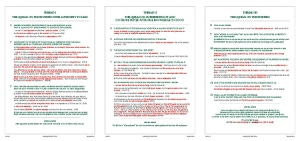Validating the Shia Imamat Part 1: The Qur’an on the Holders of Authority
By Mohib Ebrahim
Editor’s Note: Mohib Ebrahim’s article How to Validate the Shia Imamat from the Holy Qur’an presents a novel validation for the manifest Imamat of the Ismailis based on three facets of the notion of Qur’anic notion of “rightly guided, qualified leadership”. In this post, we provide excerpts related to the first of the three aspects: those vested with the authority to lead.
Click to download and read Thread I

Commentary to Thread I
Note firstly that, Allah informs us that He does not change His practices:
Such is the way of God concerning those who passed away before, and never shall you find in the way of God any change.
(Qur’an 33:62, S.V. Mir Ahmed Ali translation)
As set out from the verses cited, prior to Prophet Mohammad, Allah limited “command” or “leadership for mankind” exclusively to those who were either purified, faultless, righteous, not among the wrong-doers or disbelievers, and so forth. Then, consistent with this historical practice, Allah, in his last and final revelation (i.e. the Qur’an), instructs mankind not to obey those who have sinned or who are disbelievers. More particularly, in verse 4:59, Allah instructs those who believe to follow Him, the Prophet and “those of you who are in authority.”
Exactly who are “those in authority” has been the subject of much debate, with the Sunni insisting they may be any ruler while the Shia insisting they may only be someone pure and faultless since it makes little sense for Allah to command mankind to follow Allah and the Prophet, both of whom are pure and faultless, as well as any other ruler irrespective of their character or virtue or faith or knowledge. For, it is self-evident that if “those who are in authority” were also not pure, like Allah and the Messenger, they will make mistakes and, thus by definition, cannot be rightly guided. Consequently, to avoid being misled by such leaders, others with more knowledge would have to double-check them rendering such leaders redundant and undermining the legitimacy of their claim as rightly guided leadership.
Nevertheless, leaving aside the rational arguments as to who “those in authority” may or may not be, our methodology, when faced with conflicting interpretations, is to invoke 4:82 and see if other verses bring clarity to what is intended. If the Sunni position is correct, and “those in authority” neither have to be pure and faultless nor be of the same family from which those with “command” and “leadership for mankind” were previously appointed, then this would be, as per the verses cited:
inconsistent with Allah’s final command in the Qur’an not to obey those have sinned or who were disbelievers and render it impossible to follow,
inconsistent with Allah’s steadfast, unyielding practice — going as far back as the Qur’an speaks to — to appoint mankind’s leadership for him,
inconsistent with Allah’s steadfast, unyielding practice — going as far back as the Qur’an speaks to — to vest leadership only in the pure and the faultless, and
inconsistent with Allah’s steadfast, unyielding practice — going as far back as the Qur’an speaks to — to vest leadership with the righteous of the same family.
Furthermore and notwithstanding the above, the Sunni position — that “those in authority” do not need to be pure and faultless — is just an interpretation since there aren’t, to my knowledge, any verses in the Qur’an stating that Allah left mankind free to choose their own leaders and/or that mankind’s kind leadership do not have to be pure and faultless (and breaking with His historical practices of ii, iii and iv above and in contradiction to verse 33:62). On the other hand, the verses of the Thread speak directly to and establish the contrary. It is self-evident what is explained, understandable and corroborated by several verses takes precedence over an interpretation, with no corresponding verses to substantiate the interpretation.
Since the interpretation allowing “those in authority” to be impure, generates all these (and other) inconsistencies while the contrary interpretation clears them all, then by verse 4:82 — that the Qur’an is free of any inconsistencies — the acceptable interpretation is that “those in authority” must be the pure.
Since we are unable to judge — perfectly and without error — who are the pure, Thread III will address the apparently impossible command not to follow disbelievers or those who have sinned. Indeed, Allah has said He will judge wherein we differ (42:10, 22:67-69, 5:48, 39:46, 6:164, etc.) thus precluding us from even making such assessments.
Click on any thumbnail to download the full article, the 3 thread charts and their related commentary



